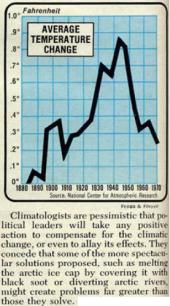The UN climate summit begins in Copenhagen.
Science has long known that more greenhouse gasses in the atmosphere equal a warmer planet; it also confirms that man-generated emissions of billions of tons of carbon over 150 years have contributed to the effect. People who refuse to accept these basic propositions are on a par with creationists for willful, ideologically-driven ignorance.
What is less certain is the extent to which climate and emissions output trends during a brief moment in geological time can be extrapolated into reliable forecasts. Feed the data into some computer models and you get shocking scenarios of what might happen if we have another century of coal-fired power stations, 747s, SUVs, deforestation and livestock flatulence: a 6C rise in temperature, widespread famine and floods by 2100. But this rests on a lot of assumptions.
Apart from some mouth-frothing militants demanding that we all go back to living in caves, most of us – even though we understand the basic science – are, if we are to be honest, pretty much unconcerned. We assume the alarmist predictions are simply too pessimistic. We expect some better technology will come along before it gets that bad. We reassure ourselves that there are also natural causes of warming and some self-correcting planetary mechanism might step in and shift water vapour levels or ocean currents and fix everything, otherwise (fingers crossed) how could life have survived for three billion years?
 Part of the reason we are laid-back is that environmentalists have produced scare stories before. We heard dire warnings about mass starvation in the 1970s owing to overpopulation, or at least forecasts that all the tin and/or copper would run out by 2000. And then there was the great global cooling scare.
Part of the reason we are laid-back is that environmentalists have produced scare stories before. We heard dire warnings about mass starvation in the 1970s owing to overpopulation, or at least forecasts that all the tin and/or copper would run out by 2000. And then there was the great global cooling scare.
And these people are ineffable bores. British writer George Monbiot is no doubt highly knowledgeable, but who, apart from devoted followers, can stomach the hand-wringing, self-righteous, “I’ve broken my self-imposed ban on flying” crusading? Multiply that by the array of worldwide all-purpose irritants whining about saving the world – Al Gore, Desmond Tutu and Mary Robinson (in today’s newspapers), Bob Geldorf, the European Union, ex-United Nations officials, Jimmy Carter, not to mention Greenpeace and the rest – and it’s enough to make you join the deniers. If your brain won’t let you do that, at least your heart can tell you it’s alright to sit back and enjoy the sight of dimwitted ultra-skeptics driving the humourless worrier-warriors up the wall in exasperation.
And then last but possibly not least, could it be that – whatever the fighters against global warming like to think – we don’t really care that much about our children and their children? Not so much that they come before ourselves.
If a giant comet were on course to slam into our planet in five years, every nation on Earth would be writing out cheques to NASA and sending rocket experts over to the US to help put something together to ward it off. But this is much longer term. For many of us, especially those not living under Himalayan glaciers, a warmer world might be a nicer place in which to carry on developing our bit-more-greenish-but-not-really-sustainable economy for a couple of decades before the next generation comes of age.
People are spending a lot of money on their kids’ education, and they never fail to remind everyone they know how extremely clever and gifted and above-average the little brats are. I have no reason to doubt them. In the last half-century we’ve come from piston-engine airliners and black and white TV to the Internet and gene therapy. I’m sure someone’s precious genius offspring will work out how to grow meat in laboratories and design cost-effective solar cells and batteries.
Indeed, the threat of inheriting a world on the brink of desertification or deluge – whichever gives our talented, spoilt, highly-strung descendents worse nightmares – might spur them on. I’m doing my bit: I tell every teenager I meet that I’m going to have ‘Warm enough for you?’ engraved on my tombstone.
It’s as worked up as I can get.
